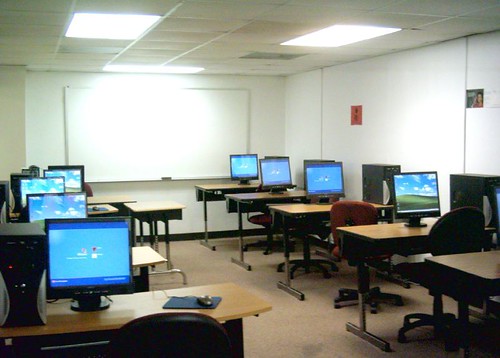Transition Techies
Graham Wegner left a comment on a posting the other day, and like I try to do with everyone that leaves a comment I visited his blog to see what he's talking about. After almost a year of being in the edublogosphere it still amazes me how few blogs I know about which is why I'm promoting the use of Will Richardson's creation EdBloggerNews. If everyone in the edublosphere started using this service then we all benefit by expanding our reading to other blogs outside of our blogroll or bloglines account. Next is to figure out how David Warlick put 'Add to EdbloggerNews' at the end of every post so we can all add that to our blogs. David?
Also we need to continue to comment on each others blogs. I'm not saying every time, but if you have something to say shout it out. I'm sure I'm not the only person who checks the links coming and going from my blog. It's a great way to expand our community.
So that leads me to this. Without Graham commenting on my blog I never would have found his entry ICT Coordinator-Techie In Disguise which led me to Brian Grenier's blog. I've visited Brian's blog before, but I admit it's been awhile since I've checked in to see what he's up to and to this posting. Graham quoted this from Brian's post, but I'm going to quote it again because I think there is a lot of us out there that feel this way.
What’s been concerning me more though is how I can get teachers to understand exactly what my job is and get them to act upon some of my suggestions. Let me try to clarify the predicament I am speaking of. If I had to sum up my job in one sentence (which I do quite often), it would be this; I assist/train teachers with integrating technology into their curriculum with the ultimate goal of improving student achievement. That said, what I have come to notice is that teachers are calling upon me NOT to help them integrate technology, but rather to fix some technical problem (printers, network access, setting up computers, etc…) I’m not quite sure how to address this situation, being that I really don't feel I am in a position to tell teachers what they should be doing in their classroom. I really don’t mind troubleshooting and solving problems for teachers, but I fear that by doing this too often I am neglecting to do what I really should, and want, to be doing. I’ve tried taking the opportunity in the past to talk to teachers about technology integration as I was in the process of fixing some technical problem, but it doesn’t seem to sink in. I usually get comments like “That’s a great idea” or “Hmmm, I never thought about doing it that way. I leave thinking that maybe this teacher will actually try implementing some of my ideas, ask me to work with them one on one to get a better grasp on strategies, or share the idea with some of their colleagues who would show some interest. I’m disappointed when the next time they approach me is not to talk about these ideas, but to fix some new technical problem. I’d really like to hear some comments about ways you would suggest, or have approached, such situations.
First I LOVE Brian's mission statement: I assist/train teachers with integrating technology into their curriculum with the ultimate goal of improving student achievement. That is a powerful statement and one that, if you don't mind Brian, I'm adopting as my own.
Secondly Brian, Graham and I all share this same frustration and like any support group I'm glad I'm not alone.
I think we are Transition Techies. We are the technology teachers/integrators/assistants or what ever term you want to use that are faced with bringing technology education into the 21st century. I'm with Brian, I'd guess that 60% of the e-mails I get at work are fixing equipment, setting up equipment or installing programs. Not that I mind doing these things and actually quite enjoy it as I find it a way to build positive relationships with my teachers. Everyone likes a knight in shining armor who can swoop in and have your printer working again, or find a lost file. But that's not my job as I view it. My job is helping teachers integrate technology in the classroom. There are two problems that I see.
1. For most schools technology integration is optional. So I am supporting an optional program. I know it's been said before but: As long as teachers have the option to integrate technology, some will opt not to. Since computers first started showing up in schools it was optional. Some teachers used the computer labs others didn't. I think we set a standard why back when of technology being optional. Now we are faced with the reality that as a system, education views technology integration as optional. I'm not talking a class web page technology; I'm talking the kind of technology that Brian relates to. The kind that has an ultimate goal of improving student achievement.
 2. Technology set up. I could be wrong but from what I've heard from others we are still in a computer lab setting for the most part. I know not all schools are this way, but as long as there are computer labs where students go to learn technology, then it will not be integrated. It will be skills and programs not learning within context. Yes students need to learn how to create powerpoints and how to work a spreadsheet, but those skills should be learned within context of the class, not separate lab times. Again we are caught in a 20th century model of education.
2. Technology set up. I could be wrong but from what I've heard from others we are still in a computer lab setting for the most part. I know not all schools are this way, but as long as there are computer labs where students go to learn technology, then it will not be integrated. It will be skills and programs not learning within context. Yes students need to learn how to create powerpoints and how to work a spreadsheet, but those skills should be learned within context of the class, not separate lab times. Again we are caught in a 20th century model of education.
This is why I call us Transition Techies. We are the technology educators who are faced with this challenge to change a system. A system that is rooted in traditions and has always been slow to change. We are the people who are caught in this transition from 20th century technology education to 21st century technology education. In the 20th century we taught powerpoint, spreadsheets, word processing. In the 21st century we should be teaching collaboration, presenting, interacting, and communicating. Our focus should not be on the programs, but what the programs can do for our students.
 One of my 7th graders had a comment the other day in class, "You mean there were computers before the Internet?" The kid's 12 years old the Internet has always been around and he can't imagine a time without it, or that there was a time you would use a computer without having Internet access. These are our students, they are 21st century learners, born in a time and world that is beyond powerpoint, spreadsheets and word processing and born in a time of communication, connections, communities, and interactions. We, the Transition Techies, are stuck between a 20th century system and 21st century learners.
One of my 7th graders had a comment the other day in class, "You mean there were computers before the Internet?" The kid's 12 years old the Internet has always been around and he can't imagine a time without it, or that there was a time you would use a computer without having Internet access. These are our students, they are 21st century learners, born in a time and world that is beyond powerpoint, spreadsheets and word processing and born in a time of communication, connections, communities, and interactions. We, the Transition Techies, are stuck between a 20th century system and 21st century learners.
[tags]21st Century Learning, Education 2.0, Blog Wondering[/tags]
Kids on computer from http://www.flickr.com/photos/zinkwazi/117097746/
Computer lab from http://www.flickr.com/photos/sojournerdouglasscollege/145134551/
Technorati Tags: 21st century learners, education
